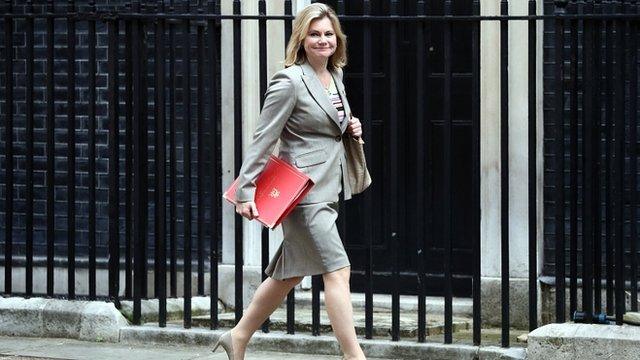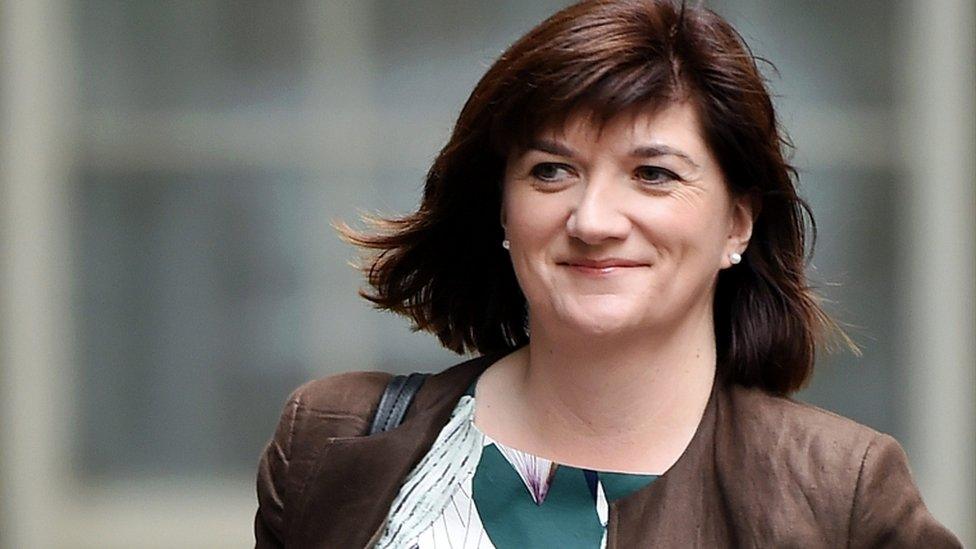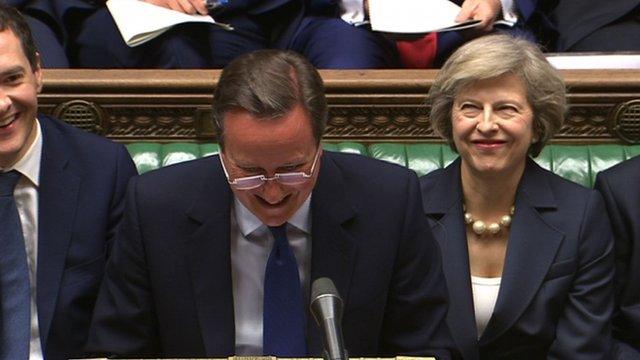Big school decisions waiting for green light from Greening
- Published

Justine Greening will have to decide what to do with school plans already published
New secretaries of state always face talk of what's waiting in the in-tray.
But for Justine Greening, Theresa May's education secretary, the first question will be what to do with the bulging out-tray.
Her predecessor Nicky Morgan has already sent out a far-reaching and controversial White Paper for schools, but it's been left in suspended animation during the political upheavals.
Will it be ditched or brought back to life?
The proposals have already been something of a car crash.
After a rebellion by backbench MPs, the plan for all state schools in England to be forced to become academies had to be abandoned only weeks after it had been announced, in one of the biggest U-turns of David Cameron's government.
The flagship might have been sunk, but there were other measures for schools that Ms Greening will have to weigh up.
There was a controversial proposal to allow academy chains to operate without any elected parent governors, which ruffled the feathers of many people who had given up their time to help local schools.
Even if academy status is not compulsory, the proposals presumed a big expansion in academy chains - and there are questions, not least from Ofsted, about the need for more rapid intervention for academy chains that are underperforming.
Another thorny question, which for many years has been kicked into the long grass, has been around the introduction of a national funding formula.

Primary schools have faced controversial changes to tests
This reallocation of how much money goes to each school has been promised for 2017 and is a response to many years of campaigning over uneven levels of per pupil funding.
But it has always been extremely politically sensitive - with the expectation that there will be losers as well as winners - and the prospect of individual schools facing big funding cuts is going to be difficult to set against promises to protect school spending.
It also touches upon a bigger budgetary question - whether the incoming government will still be bound by David Cameron's promise to protect the education budget.
Also in this political limbo are plans for a major overhaul of teacher training and the abolition of the current "qualified teacher status".
Changes to teacher training mean treading across the thin ice of a shortage of teachers - a problem that head teachers have been noisily warning about as one of their biggest headaches.

Nicky Morgan's plans for changes to schools had not yet reached the stage of legislation
There are other reasons head teachers and teachers' unions could be knocking on the door.
There have been angry complaints and calls for resignations over changes to the Sats tests, which this year saw almost half the 11-year-olds in England failing to reach the expected level.
The changes to GCSEs and A-levels - including switching to grades nine to one rather than A* to U - are likely to have their own share of teething difficulties, not least explaining the change to parents and employers.
The next education secretary will be in place when the next results of international Pisa tests are published.
These rankings are revealed by the OECD every three years - and if England has nudged upwards, the incumbent can take the praise.
If it's another mediocre performance, they will have to say that it's still too early to judge the impact of changes.
But the most pressing problems are likely to be more practical than political.
The population surge continues, and that means an ever tighter squeeze on school places. Figures published by the Department for Education on Thursday showed that 570,000 extra secondary school places need to be created by 2025.
Whoever is education secretary, they will have to work hard to deliver the most basic requirement of guaranteeing a school place for every child.
It will mean a relentless demand for more classrooms, schools, teachers and head teachers - all of which will mean spending more money just to stand still.
Pressure on school budgets is already an issue worrying schools, and that is only likely to grow.

Will David Cameron's targets for free schools be continued?
It might also be worthwhile checking the education credentials of the new boss.
Theresa May must have attended more types of school than most ministers. She went to a state primary, an independent school and then a grammar that became a comprehensive.
She served as a councillor in the trenches of local government and was education chair for the London Borough of Merton.
While others entered politics after writing pamphlets for think tanks, she must have had a lot more practical experience of writing letters to parents about school places.
Under William Hague's leadership she was shadow education secretary.
Her plans included "free schools" directly funded but independent from local authority supervision, which could set their own admissions rules and rates of pay for their staff.
The role of local education authorities would have been pared back and new grammar schools opened.
There was a promise from her party leader that teachers would be freed from being tied in knots by "a string of Whitehall diktats, meaningless targets and paperwork".
It might all sound rather familiar.